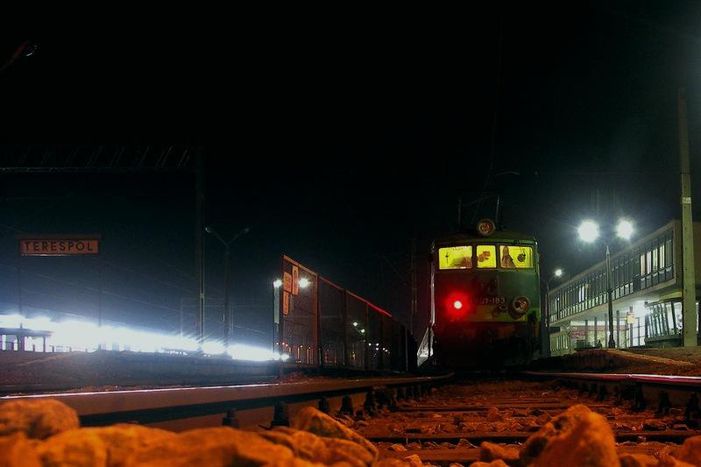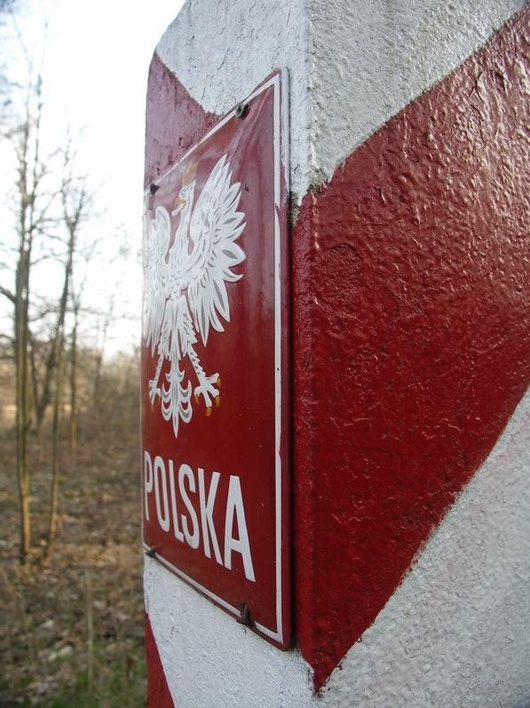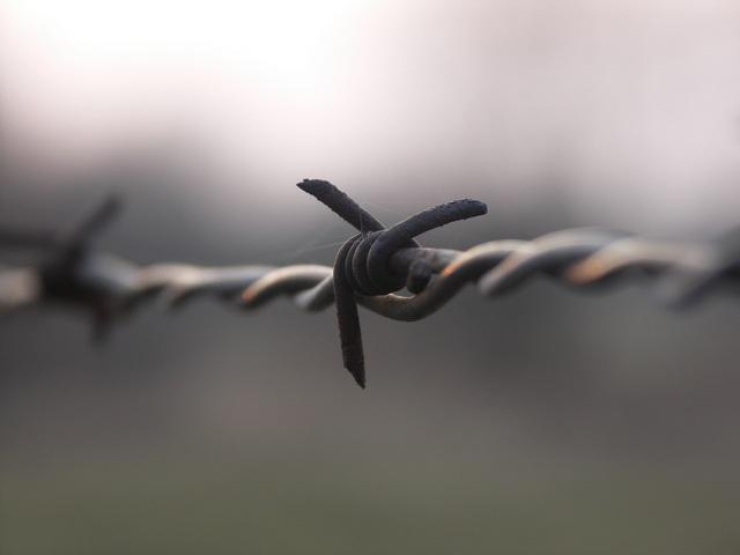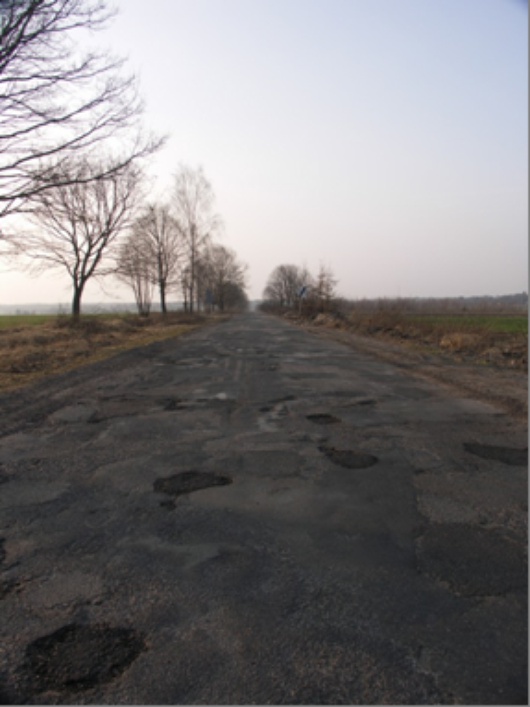
Smuggling cigarettes in Schengen Poland
Published on
Translation by:
 Media Consulta
Media Consulta
With the admission of Poland into the Schengen zone on 1 January 2008, smuggling is on the way out - perspective
It’s two in the morning. The train from Brest glides along the bridge over the river Bug. A head sticks out of a window in the first carriage. It’s the train manager who made a deal with the Poles. Before leaving he’d bought packs of cigarettes in Belarus. Suddenly the head disappears and large packs of cigarettes are flying out of the window. The merchandise lands precisely in the bushes on the Polish shore. Within less than a minute, a group of five boys emerges from the dark thicket. They grab the karopki and make off. They must run pretty fast, as the place is swarming with border security guards who are not to be messed around with.
It was a successful drop that night. The Polish dealers earned their bread and the myth of the tight eastern border of the European Union crashes in the bushes along with the hot merchandise. Luckily, the era of Poland B is on the way out. The admission of Poland into the Schengen zone on 1 January 2008 cuts off this bizarre world from the old system of values. Smuggling is on the way out, and the EU borderland citizens have to learn how to survive in the new reality. It still hurts today, but the pain will be soon be over.
Vodka, cigarettes and petrol
 I’m standing on the crooked pavement of the square in front of the tatty Terespol railway station. Belarus is only a few kilometers east from here. Against the gloomy backdrop of the townlet buildings a new, nicely smelling white board stands out, complete with the Polish and European Union flags. Soon I’ll know that it is the only wordly feature of this town which has found itself on the way to economic collapse. The Saturday morning silence is broken only by the whistle of the train leaving for Brest and the barking of a homeless mongrel. What’s it like to live here? I ask myself, going 'downtown'.
I’m standing on the crooked pavement of the square in front of the tatty Terespol railway station. Belarus is only a few kilometers east from here. Against the gloomy backdrop of the townlet buildings a new, nicely smelling white board stands out, complete with the Polish and European Union flags. Soon I’ll know that it is the only wordly feature of this town which has found itself on the way to economic collapse. The Saturday morning silence is broken only by the whistle of the train leaving for Brest and the barking of a homeless mongrel. What’s it like to live here? I ask myself, going 'downtown'.
After I have taken a few steps, my way is blocked by five poorly dressed older women holding huge plastic bags. 'Vodka? Cigarettes? Anything for you, Sir,' they say, fighting for my attention. They are asking 3.50 zloty (1 euro or 80p) for a packet of 'More' cigarettes, and 12 zloty (3.60 euros or £2.90) for a bottle of 'Artemida' vodka. All the time they look around nervously to make sure a police car is not coming. They can ill-afford the high fines. Saddened to hear that I don’t smoke and that I drink very little, they sell me one bottle with a label full of incomprehensible Russian inscriptions. They haven’t made much. Welcome to the European Union, I think to myself.
Customs officers harder To bribe
'People go bankrupt on a daily basis! For the last three months I’ve had only ten guests in my hotel. Before, I would be full all year round,' complains an embittered Dawid, a Terespol hotel owner. After Poland was admitted to the Schengen zone on 1 January, traffic on the Belarusian border decreased by a half, according to January statistics drawn up by the Border Guard Podlasie division. The town, teeming with life in the past, is rapidly changing into a hole that time forgot. People can’t make ends meet, and there is only one thing—according to Terespol citizens—which hasn’t been destroyed yet; the smuggling of vodka, cigarettes, and petrol. 'It’s still how it used to be, only the prices have gone up as the customs officers are more difficult to bribe,' say the smugglers.
''The prices have gone up as the customs officers are more difficult to bribe' - smugglers
'Rubbish!' responds assistant superintendent Cezary Grochowski, the spokesperson for the Municipal Police Department in Biała Podlaska, to the boys’ allegations. 'The policemen and border guards go out of their way to dispose of the smugglers, once and for all.' He does admit, however, that individual cases still crop up, but, in his opinion, the times of smuggling are over. 'A few years ago we would stop at least one car filled with contraband stuff a day. Now, we are surprised if we get one a month!' promises the assistant superintendent. He backs up his claims with hard facts—lately seventeen car ring operations have been cracked (stolen cars were taken apart and their parts sent to Belarus). Also, thirty dens where Poles could drink Russian 'vodka' made of solvent have been closed down. Every month, there are fewer and fewer people arrested for illegal trade in cigarettes and alcohol.
A godforsaken place

Lean years on the eastern partition had begun long before Poland became part of the Schengen zone. Since the introduction of the Russian embargo on Polish meat, more and more meat plants have collapsed like a house of cards. Both legal and illegal trade with Belarus had flourished until 21 December 2007, so it was possible to make up for the losses. Today, Terespol citizens are fearful of what the future may bring. Old systems no longer count, and the new possibilities for development are just looming on the horizon. As every revolution brings casualties with it, no wonder the locals are holding on for dear life to the old ways of doing things. 'My friend was once one of the biggest entrepreneurs here. He ran a meat plant, a butcher’s shop, owned a few trucks, and employed more than 100 people,' lists Dawid, the hotel owner. 'He managed a hotel and a shop in Sławatycze, and Terespol… He went bust over the last few months, had to let his employees go, his trucks are just stood there,' he points out. There are more people like him living here. For them, Schengen seems to be the nail in their coffin.
And it’s all because Schengen visas cost Belarusians a whole sixty euros (£50). In president Alexander Lukashenko’s country, that’s one third of their monthly salary. In the past, our neighbours would bring cheap cigarettes and alcohol to Poland, and with the money they made from the sales they would buy our food, toys, and so on. This symbiosis made it possible for the whole town to thrive. Nobody is willing to come any more, and it’s rumoured to only get worse. Polish visas, issued before our admission to the Schengen zone, are about to expire. No one will come then. 'Did you see how empty the border was? And the commercial centre nearby? Before Schengen, it was almost impossible to park your car, and queues at the border run for many kilometers. One could make good money. And now it’s misery,' recalls an infuriated Dawid.
'When Russians run out of their visas, there’ll be trouble' - Pawel
'When Belarusians’ old visas run out,' he continues, 'we’ll get stuff delivered from Ukraine. They get free visas within a radius of fifty kilometers from the border, so they pay a bit more and come here. Slowly things should settle down.' 'It will always be worth our while,' says a toothless female fag vendor from Pigalak, the square in front of the station. Young Paweł from the bicycle shop isn’t as optimistic: 'When Russians run out of their visas, there’ll be trouble! Half the shops will fail. We will live in a godforsaken place!'
The river of money flows east
 People like Paweł have gotten used to the Poland B citizen label. They don’t trust politicians - both Polish ones and the ones from Brussels. In the meantime, their regions are being flooded with EU funds. Until the end of 2015, Poland is entitled to spend 67 billion euros (54 billion pounds) from structural funds laid out to enable her to catch up with rich western countries. The government has allocated cash for each province. The Lublin province will get 1.15 billion euros (919 billion pounds) as part of the Regional Operational Program. The money will be spent on repairing hundreds of roads full of holes, developing transport, the construction of a sewage treatment plant and a new airport, even private entrepreneurs will apply for donations to support development … The list of planned investments goes on and on.
People like Paweł have gotten used to the Poland B citizen label. They don’t trust politicians - both Polish ones and the ones from Brussels. In the meantime, their regions are being flooded with EU funds. Until the end of 2015, Poland is entitled to spend 67 billion euros (54 billion pounds) from structural funds laid out to enable her to catch up with rich western countries. The government has allocated cash for each province. The Lublin province will get 1.15 billion euros (919 billion pounds) as part of the Regional Operational Program. The money will be spent on repairing hundreds of roads full of holes, developing transport, the construction of a sewage treatment plant and a new airport, even private entrepreneurs will apply for donations to support development … The list of planned investments goes on and on.
It doesn’t end there. A special piece, deemed exclusively for the eastern border of Poland, has been cut out from the gigantic structural funds pie. Within the Eastern Poland Development program framework, 2.3 billion euros (1.8 billion pounds) will be spent on projects allowing those regions, which have been neglected for years, to catch up with the rest of Poland. It’s thanks to these funds that each commune will get internet access. The streets are basically paved with gold. But who knows about it? The visionaries will definitely make it. They’ll get their share for development, and foreign investors will come to the region. But such a process doesn’t happen overnight. Patience is needed; but not everyone can afford to be patient.
EU borders tight only on paper?
That’s why today, many people still try it on in order to survive. Like old times, they say. Marek, a likeable IT college student, supplements his income on the side after classes. He says he has no option. 'Cigarettes, oil, petrol. One needs to plot all the time. Much depends on the customs officers. If you get an old friend, he’ll let you through without checking the car. It’s more difficult on the Belarusian side. Sometimes you need to put a few dollars in the passport,' he explains. 'My friend has a Passat; you know the station wagon type that can hold up to 140 litres of petrol. We make fifty groshes on every litre,' he continues. I ask him if he knows somebody who got caught. 'Once, my friend’s car got totally taken apart at the border, they even took the tyres off the wheel rims. They found forty cartons of cigarettes. He had to pay 15 thousand zloty (4,464 euros or 3, 568 pounds), they took his car away, and he got a two year suspended sentence,' says Marek. 'He’s bounced back, though, and now smuggles much more,' he adds, grinning from ear to ear.
You can make more, 'as much as' 100 zloty (30 euros or £24) per head, by doing train drops. It’s a big risk, though, as the border guard controls the Bug bridge very carefully. 'I’ve never got caught. Once, I had to go swimming in the Bug River in order to hide from the guards. It happened recently, in January. I got a bonus for my commitment,' boasts Marek. In his opinion, the EU eastern border is tight only on paper. And that’s in spite of the 313 million euros (£250), according to the Polish Foreign Ministry website, that Poland has received from the Schengen Fund for the purchase of new equipment and training of guards.
Yesterday they smuggled, today they catch others
'Smuggling has always been around and will always be here' - lieutenant colonel Andrzej Wójcik
'We can’t work miracles! Smuggling has always been around and will always be here. But we know how to tackle it,' says lieutenant colonel Andrzej Wójcik, the press spokesman for the commanding officer of Nadbużańska border guard. 'We’ve seen an increase in the attempts to smuggle cigarettes since their prices went up in Poland. It’s not so profitable for them to bring in alcohol, though,' says Wójcik. The border guard knows all about the train drops. The Terespol border crossing is quite famous for it, but so is the one in Dorohusk, on the Ukrainian border. 'We guard those trains carefully, their attempts fail, and we confiscate the goods,' the spokesman swears. He assures me that the border is tight and very well guarded. As if to prove his words, he reminds me that since Poland became an EU member state in 2004, the European experts have visited the border several times. They said we were 'quite well' prepared for securing the external border of the European Union. And the border guard was called 'one of the most effective in the whole of the EU.'
Young smugglers say they have friends, who used to do drops with them in the past, working for the border guards. But these are exceptions. Most guards are strict jacks-in-office, who make a big deal out of one packet of cigarettes. But some policemen have dealers even in their own families, as my interlocutors assure me. This city is like a living thing, people would be lost without others. Not so long ago, there was a bunch of smart asses from Łuków, wanting to do business with the 'Russians'. They would buy stuff on Pigalak. They would pay half a zloty (15 cents or 12 p) more per bottle. 'Taking our bread,' rages Łukasz, a Pigalak dealer. 'The pigs arrived pretty quickly, caught them red-handed, and we didn’t see them again. The police look after the interests of our own people,' he concludes.
Get used to the way it is here
Vodka and cigarettes is only part of the business. At the border, you can make money on Belarusian prostitutes, and even on illegal sales of caviar. In the old days of border traffic, queues were arranged at the Terespol border crossing. You would join the end of the line, and see you have to wait umpteen hours. All you had to do was stick some money out of the window to the right person, and off you would go, first in line. How did the other drivers react? 'Last year there was this guy who kind of tried to make a stand. They poured petrol on his car and set fire to it in broad daylight,' remembers Łukasz. 'What about the police? How do they react?' I ask, making him sneer.
'They know all about it. Two weeks ago they set fire to a mate of my father’s. Who, where, how … The fuzz knows, but nobody will shift their arse. So what do the police do around here? They catch drunks on bycicles,' says the dealer. 'My mate’s brother was hanged in his own house. He got involved in the drops, taking stuff that didn’t belong to him. Two months ago they slit his throat. Sure, he had to be on the fiddle somewhere. Rumours fly that he was fooling around with Russian whores, one day they had a fight, and the girls complained to the Ruskies,' lists Łukasz, as if he was talking about the weather. 'That’s the way it is round here. Everybody has gotten used to it.'
A few years will go by and people like Marek, Łukasz or Paweł will have to change their ways. The Caropcas will stop landing in bushes under the railway bridge, because there will be no one to pick them up. The Terespol lads will go to university, and the older ones will start in honest jobs. To eastern Poland, stuck in the past, EU money will draw new ideas for 'making money' and work will follow. The smashed walls of the old world will be noticed by our neighbors over the border. Who knows, maybe even Lukashenko will change his palace in Minsk for a villa near Volgograd? 'Do you feel like a European Union citizen?' I hopefully ask Paweł, the bicycle salesman. 'No, I don’t. They live over there, having no idea what’s going on here. We’re still living in the stone age,' he says, as we part.
This is the full translated version of the original article by the winner of the European Young Journalist of Poland 2008
Translated from Tu na Schengen nie czekali


